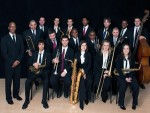Title
Imagine being a young jazz composer, constantly struck with inspiration for a new tune. You have just spent many sleepless nights orchestrating and arranging your masterpiece. Now, imagine trying to assemble a 17-piece band of the best young musicians, having them rehearse your piece three or four times, and getting them to perform the work in a packed theater, all for free! Seems like this would only be possible in your wildest dreams, right? However, this is exactly what 10 student composers will experience as the Juilliard Jazz Orchestra prepares for its concert on April 8.
Body
Imagine being a young jazz composer, constantly struck with inspiration for a new tune. You have just spent many sleepless nights orchestrating and arranging your masterpiece. Now, imagine trying to assemble a 17-piece band of the best young musicians, having them rehearse your piece three or four times, and getting them to perform the work in a packed theater, all for free! Seems like this would only be possible in your wildest dreams, right? However, this is exactly what 10 student composers will experience as the Juilliard Jazz Orchestra prepares for its concert on April 8.
At a renowned institution such as Juilliard, students are constantly immersed in the musical world of the “greats” in their respective fields of study. On an almost nightly basis, one can stumble into a concert hall at the School and hear the music of some of the most distinguished composers of historic and modern times. This is no exception in the Jazz Studies department as the big band spends time throughout the year delving into the classic music of Duke Ellington, Billy Strayhorn, and Count Basie, as well as contemporary composers such as Maria Schneider, Terence Blanchard, and most recently, Christian McBride. However, Carl Allen, artistic director of jazz, is always sure to encourage students to write their own pieces for big band instrumentation so they’ll have a chance to hear them played by some of the world’s finest jazz students at the yearly concert of original works.
Working closely with Allen on the performance is Brandon Lee, the new director of the Jazz Orchestra. Joining the faculty in 2008, Lee, 26, became the official director of the ensemble at the beginning of this school year, and he is no stranger to the department. In the fall of 2001, he joined 17 others as a student in Juilliard’s brand new Jazz Studies program. Since then, Lee has earned both his bachelor’s and master’s degrees from the School, as well as an Artist Diploma. Therefore, it is easy to say that he was qualified for the position.
Lee believes that the experience gained by the students participating in the upcoming concert will be extremely helpful and educational. During their preparation, students will learn invaluable lessons that, while in school, can really only manifest on this virtual bandstand. In a recent interview, Lee said that each one of the composers will “work on their leadership skills as they stand in front of this band during rehearsals.” They have all “chosen to take advantage of hearing their tunes played by this great band for free, and will need to express to the band how they want their music to sound.” These leadership skills are extremely important as many of us prepare to leave school and form our own bands, no matter the size.
In addition, as the students hear their own music played, their musicianship will grow. “Once the students play their own tunes, they’ll see things differently,” Lee said. As the composers prepare for the show, “they are going to want their own pieces to sound good. Therefore, they will expect the musicianship of the other students to be high. As a result, they will relate this experience when they approach the music of other composers.”
Lee will also be working closely with each composer so that his or her music is performed at the highest level. It will likely be a delicate process as Lee rehearses these pieces and offers his musical suggestions, but he says he is not intimidated by the task. “I’ve heard and played so many different styles of music, I will probably get a pretty good idea of what kind of sound they are trying to get to,” he said. “Still, as we rehearse, I will do my best to keep an open dialogue with each composer and ask if each suggestion I make is O.K.” Ensuring that this process is “not a dictatorship” is how he generally strives to run his rehearsals. For Lee, who is close in age to many of the people he’ll be leading—some were even classmates at one point—navigating the transition from peer to instructor was a bit tricky. “At first,” he said, “I wanted to stay cool and not separate myself from the students. I wanted to say, ‘Yeah, I was just a student, so we’re all in this together. Just because I have this position doesn’t mean I have more skills than any of the students in this program.’” But the three degrees under his belt and his experience leading combos since high school have certainly helped prepare him, and he is confident that he’ll be able to lead the big band to good results.
The opportunity for each composer to present his or her musical identity on stage is a dream come true, and the audience in Alice Tully Hall will have a chance to hear what Juilliard Jazz students have to say.





